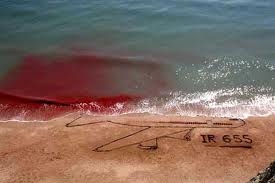| Iran Air Flight 655 was shot down by the US Navy's guided missile cruiser USS Vincennes on Sunday July 3, 1988, killing all 290 passengers, including 66 children, and crewmembers onboard. |

The civilian airliner, carrying passengers from Iran, Italy, the UAE, India, Pakistan and the former Yugoslavia, was en route from Iran's southern city of Bandar Abbas to Dubai when it was hit by two SM-2MR surface-to-air missiles launched from the warship commanded by Captain William C. Rogers III.
Following the tragic incident, ranked seventh among the deadliest airliner fatalities, unapologetic US officials said their naval officers had mistaken the Iranian Airbus A300 for an F-14 Tomcat fighter.
They went on to claim that the Vincennes crew had been under a simultaneous psychological condition called 'scenario fulfillment', and had therefore confused their training scenario with reality and responded accordingly.
Iran declared the incident an international crime, saying that even if the warship crew had mistaken the Airbus for an F-14 the tragedy was the result of the US Navy's negligence and reckless behavior.
Iran further argued that the aircraft was flying within the Iranian airspace and did not have an attack profile, and as the warship crew were fully trained to handle 'simultaneous attacks' by enemy aircrafts they could have handled the situation in a manner that would not claim civilian lives.
When the matter was taken to the United Nations Security Council in July 1988, the then US Vice President George H.W. Bush defended the Vincennes crew's action and said that given the situation the officers in question had acted appropriately.
Eventually, the UN Security Council Resolution 616 was passed, which expressed "deep distress" over the downing, "profound regret" for the loss of life, and stressed the need to end the Iraq-Iran war.
In August 1988, George H.W. Bush was quoted by Newsweek as saying, "I'll never apologize for the United States of America. Ever, I don't care what the facts are."
The Vincennes crew received combat-action ribbons. Lieutenant Commander Scott Lustig, air-warfare coordinator on the Vincennes, was awarded with the Commendation Medal for 'heroic achievement', noting his 'ability to maintain his poise and confidence under fire'.
The US government refused to claim responsibility for the incident and to apologize to the Iranian nation for the appalling act which brought unspeakable pain and grief to countless families.
